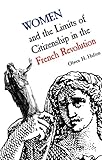Women and the Limits of Citizenship in the French Revolution / Olwen Hufton.
Material type: TextSeries: HeritagePublisher: Toronto : University of Toronto Press, [1999]Copyright date: ©1999Description: 1 online resource (228 p.)Content type:
TextSeries: HeritagePublisher: Toronto : University of Toronto Press, [1999]Copyright date: ©1999Description: 1 online resource (228 p.)Content type: - 9781442683556
- 944.04/082 20
- online - DeGruyter
| Item type | Current library | Call number | URL | Status | Notes | Barcode | |
|---|---|---|---|---|---|---|---|
 eBook
eBook
|
Biblioteca "Angelicum" Pont. Univ. S.Tommaso d'Aquino Nuvola online | online - DeGruyter (Browse shelf(Opens below)) | Online access | Not for loan (Accesso limitato) | Accesso per gli utenti autorizzati / Access for authorized users | (dgr)9781442683556 |
Browsing Biblioteca "Angelicum" Pont. Univ. S.Tommaso d'Aquino shelves, Shelving location: Nuvola online Close shelf browser (Hides shelf browser)

|

|

|

|

|

|

|
||
| online - DeGruyter Witnessing AIDS : Writing, Testimony, and the Work of Mourning / | online - DeGruyter Woman of the World : Mary McGeachy and International Cooperation / | online - DeGruyter Women and the Canadian Welfare State : Challenges and Change / | online - DeGruyter Women and the Limits of Citizenship in the French Revolution / | online - DeGruyter Women Challenging Unions : Feminism, Democracy, and Militancy / | online - DeGruyter Women Who Taught : Perspectives on the History of Women and Teaching / | online - DeGruyter Women Without Men : Mennonite Refugees of the Second World War / |
restricted access online access with authorization star
http://purl.org/coar/access_right/c_16ec
The French masses overwhelmingly supported the Revolution in 1789. Economic hardship, hunger, and debt combined to put them solidly behind the leaders. But between the people's expectations and the politicians' interpretation of what was needed to construct a new state lay a vast chasm. Olwen H. Hufton explores the responses of two groups of working women - those in rural areas and those in Paris - to the revolution's aftermath.Women were denied citizenship in the new state, but they were not apolitical. In Paris, collective female activity promoted a controlled economy as women struggled to secure an adequate supply of bread at a reasonable price. Rural women engaged in collective confrontation to undermine government religious policy which was destroying the networks of traditional Catholic charity.Hufton examines the motivations of these two groups, the strategies they used to advance their respective causes, and the bitter misogyinistic legacy of the republican tradition which persisted into the twentieth century.
Mode of access: Internet via World Wide Web.
In English.
Description based on online resource; title from PDF title page (publisher's Web site, viewed 01. Nov 2023)


